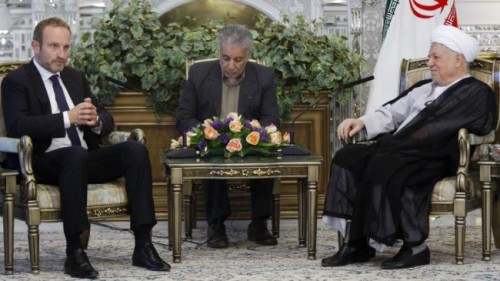PHOTO: Danish Foreign Minister Martin Lidegaard with former Iranian President Hashemi Rafsanjani
Social media is filled with speculation that the Danish Foreign Minister is visiting Iran on behalf of NATO, the US, and its “coalition” for action in Iraq against the Islamic State.
Martin Lidegaard set out for Tehran just after last week’s NATO summit in Wales discussing joint action against the jihadist advance. On Sunday, he was welcomed by Iranian Foreign Minister Mohammad Javad Zarif and President Rouhani, who “called on the West to deal seriously in fighting terrorism”.
In his latest meetings, Lidegaard has met the Secretary of the National Security Council, Admiral Ali Shamkhani — a key figure in Iran’s politics over the Iraqi crisis — and Hashemi Rafsanjani, the former President who heads the Expediency Council.
Iranian media have trumpeted Shamkhani’s declaration, “The Islamic Republic of Iran has always been a pioneer in fighting terrorism and today it plays the most influential role in confronting this ominous phenomenon by supporting the Iraqi people.”
Those outlets are hinting that a deal for cooperation in Iraq would increase concessions by the West over sanctions on Tehran, with Lidegaard saying the restrictions hurt the European Union as well as Iran.
However, any negotiations via the Danish envoy are not halting Iran’s hostile rhetoric against the US. In the latest blast, the deputy head of armed forces, General Massoud Jazayeri, asserted:
World public opinion is aware that the phenomena such as Jabhat al-Nusra, the Islamic State of Iraq and the Levant, Al Qa’eda and other terrorist groups in the region, have been created by the intelligence services of the US and the White House’s allies.
They have a mission to defame dear Islam to prevent the people’s conversion to the real Islam and to spread Islamophobia and weaken the regional resistance front.
The answer to the riddle of negotiations while continuing to denounce Washington? It may lie in Shamkhani’s coded demands over any cooperation in a “coalition” — in public or private — against the Islamic State in Iraq.
Any anti-terrorism action should be sincere, real and based on regional capacities and partnership and without violating the country’s sovereignty and without a pursuit of hegemonic political and security goals.

